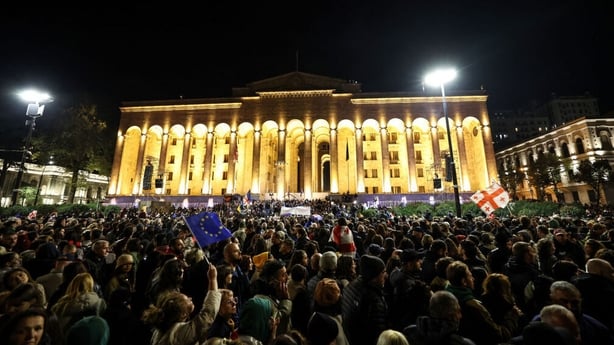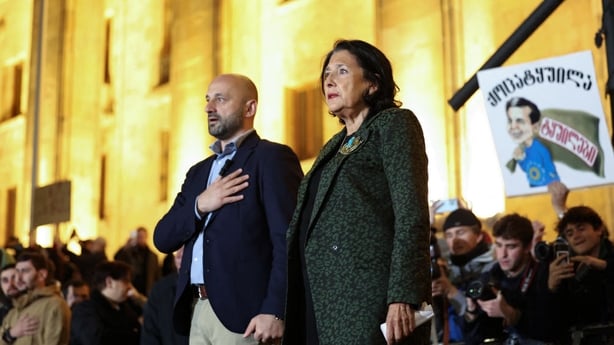Thousands of Georgians have taken to the streets after the pro-EU opposition called for mass demonstrations, accusing the ruling party of "stealing" this weekend's parliamentary election.
Demonstrators gathered outside the main parliament building in central Tbilisi, AFP journalists saw, as international criticism mounted over voting irregularities, and Georgian election monitors claimed to have uncovered a large-scale fraud scheme that altered the election outcome in favour of the ruling party.
The country's government and electoral commission have said the vote was free and fair, while election observers have said there were significant violations.
Earlier, Georgia's president called for protests following the disputed parliamentary election, while the United States and the European Union urged a full investigation into reports of violations in the voting.
The results, with almost all precincts counted, were a blow for pro-Western Georgians who had cast Saturday's election as a choice between a ruling party that has deepened ties with Russia and an opposition aiming to fast-track integration with Europe.

President Salome Zourabichvili, a former ally of Georgian Dream who has become its leading critic, had urged people to take to the streets to protest against the results of the ballot.
In an address, Ms Zourabichvili - whose powers are mainly ceremonial - referred to the result as a "Russian special operation".
She did not clarify what she meant by the term.
Ms Zourabichvili urged Georgians to protest in the centre of the capital this evening to show the world "that we do not recognise these elections".
Russia angrily denied charges of election interference.

"We strongly reject such accusations - as you know, they have become standard for many countries. At the slightest thing, they immediately accuse Russia of interference," Kremlin spokesman Dmitry Peskov said.
"There was no interference and the accusations are absolutely unfounded," Mr Peskov added.
Mr Peskov described the election result as "the choice of the Georgian people" and said it was the West, not Russia, that was trying to destabilise the situation.
'Constitutional order' challenged
Georgian Prime Minister Irakli Kobakhidze accused the opposition of attempting to "shake the constitutional order" of the country, local media reported.
He also said his government remained committed to European integration.
But among the strongest responses in Europe to the events in Tbilisi, Italian Foreign Minister Antonio Tajani said Georgian opposition parties were "absolutely right" to dispute the election results and he too pointed a finger at Moscow.
"We all know what Russian interference systems are," he told Italian daily Il Messaggero in an interview published.
NATO added its voice to the calls for a full probe of what it called the "uneven playing field" in Georgia's election, echoing an earlier demand from US Secretary of State Antony Blinken.
"... we encourage Georgia's political leaders to respect the rule of law, repeal legislation that undermines fundamental freedoms and address deficiencies in the electoral process together," Mr Blinken said in his statement.
Shares in London-listed Georgian banks fell, with TBC Bank down 9.8% and Bank of Georgia down 7.3%, amid concerns of possible political instability.
The European Union also urged Georgia to swiftly and transparently investigate alleged irregularities in the vote.
"The EU recalls that any legislation that undermines the fundamental rights and freedoms of Georgian citizens and runs counter to the values and principles upon which the EU is founded, must be repealed," the European Commission said in a joint statement with EU foreign policy chief Josep Borrell.
For years, Georgia was one of the most pro-Western countries to emerge from the Soviet Union, with polls showing many Georgians disliking Russia for its support of two breakaway regions of their country.
Russia defeated Georgia in their brief war over the rebel province of South Ossetia in 2008.
The election result poses a challenge to the EU's ambition to expand by bringing in more former Soviet states.
Moldova earlier this month narrowly approved adding a clause to the constitution defining EU accession as a goal.
Moldovan officials said Russia meddled in the election, a claim denied by Moscow.
We need your consent to load this rte-player contentWe use rte-player to manage extra content that can set cookies on your device and collect data about your activity. Please review their details and accept them to load the content.Manage Preferences

